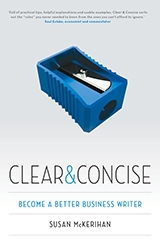Susan McKerihan spent 20 years as the Plain English editor in one of Australia’s largest firms, PwC.  She has worked with consultants in all disciplines, industries and sectors, helping them write clear and succinct technical and advisory reports. In the lead-up to her workshop we picked her brain about writing clearly and concisely.
She has worked with consultants in all disciplines, industries and sectors, helping them write clear and succinct technical and advisory reports. In the lead-up to her workshop we picked her brain about writing clearly and concisely.
Can you tell us a bit more about Plain English and why you have devoted yourself to learning and teaching it?
Plain English is an approach to writing that puts the reader first. It’s sometimes caricatured as being about simple words and short sentences, but that’s totally misleading. There’s far more involved – for example, organising the content in a way that makes sense to the reader, and designing the document to be user-friendly. And the ‘reader’ – or user I suppose you could say – is paramount, so every document is different. What surprises a lot of people is that even the most complex and technical subjects can be presented in Plain English without losing any of their intellectual rigour or value.
I was converted after hearing a talk by Robert Eagleson (the ‘father’ of Plain English in Australia). Everything fell into place: if you want people to value or act on what you’ve written, you have to make sure the message is crystal clear. And I was lucky – I started working as an in-house Plain English editor and found that people were very receptive. They wanted to write clearly, but struggled to convert their ideas into persuasive documents. So I gradually devised ways to help them.
What are some of the common mistakes you find in a piece of writing that is trying to be persuasive, and simply isn’t? Can you give us some examples?
The most common mistakes I’ve found are (1) forgetting there is a reader involved, and writing for yourself – for example, describing background and history in great detail when the reader is thinking “So what?”; and (2) trying to be too clever with obscure language. Nothing puts a reader off more quickly than sentences like “It’s about being very clear around the purpose and ensuring cross-sector fertilisation to continually exploit linkages and synergies in order to achieve value creation and deliver against that purpose.” Readers lose patience, and it doesn’t help the writer’s credibility.
What are some of the applications of Plain English for writers – who can it benefit and why should writers be aware of it?
I believe every writer can benefit from it, regardless of the genre or industry they’re working in. The principles of Plain English are clarity, accuracy, relevance and readability, which is surely the goal for most writers. Plain English is usually thought of in the context of business or legal writing, but it’s just as appropriate for academia, medicine, possibly even creative writing – and certainly for publisher or funding submissions. Really, any writing where you want to get a message across clearly and accurately.
You’ve just published a practical guide to business writing called Clear and Concise: Become A Better Business Writer. How did you find the process of writing and publishing your first book?
The process of writing was long and intense, but I loved every minute of it. I had to pull together all the material and information I’d gathered over years and years, and then make it readable! Once I’d signed the publisher’s contract I thought the process was over, but there was still a lot of work to do and decisions to be made. I was lucky – and honoured – to be accepted for publication by Black Inc. They have a hugely professional and knowledgeable team and I really enjoyed working with them. And being edited was an eye-opening experience – until then, I had been the one doing the editing!
Susan McKerihan will be running An Introduction to Plain English on Saturday 20 June. Click here for details.
